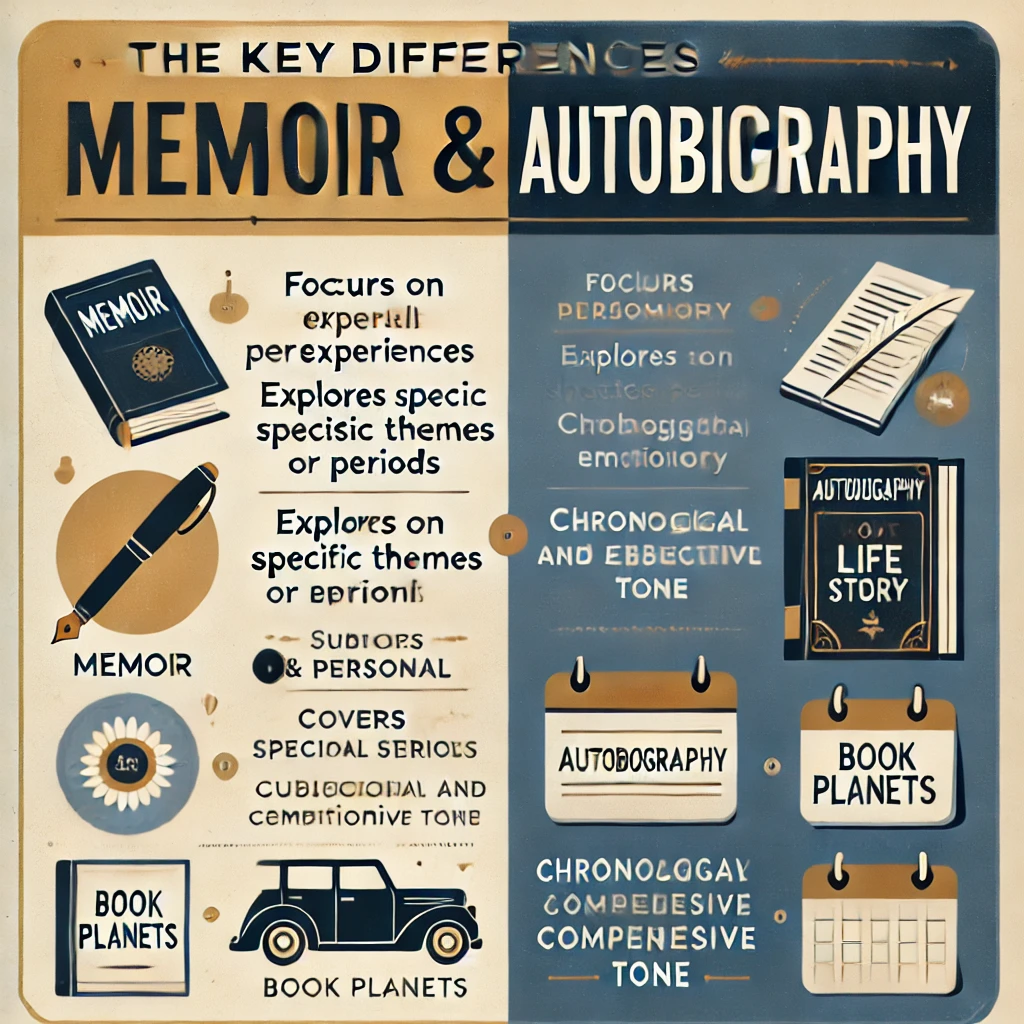Everybody has a unique story in their lives, but when it comes to saying the word through a pen, two popular formats often come to mind: memoir and autobiography. While they share similarities, they serve distinct purposes and cater to different audiences. Therefore, before indulging in writing about your life, it is important to understand these differences. It is essential for anyone considering writing their life story or hiring memoir ghostwriting professionals to craft their narrative.
In this guide, we’ll break down the key differences between Memoir and Autobiography, helping you decide which format best suits your story.
What Is a Memoir?
A memoir is a deeply personal account that focuses on a specific period, theme, or experience in the author’s life. Rather than recounting an entire life chronologically, memoirs dive into emotions, lessons, and defining moments.
Characteristics of a Memoir:
- Theme-Based: Centers around a single idea, such as overcoming hardship, personal growth, or adventure.
- Emotional Depth: Engages readers through deep reflections and personal insights.
- Non-Linear Structure: Events may not be told in chronological order but are arranged to highlight significance.
- Subjective Perspective: Written in the first person with an intimate and personal tone.
- Focus on a Limited Timeframe: Rather than covering an entire life, memoirs spotlight a particular period or defining moments.
- Narrative-Driven: Uses storytelling techniques to immerse readers in the experience.
What Is an Autobiography?
An autobiography, in contrast, is a comprehensive account of an individual’s entire life, often beginning from birth and detailing experiences chronologically. It focuses on factual events and accomplishments rather than emotions and personal growth.
Characteristics of an Autobiography:
- Chronological Order: Events are structured from early life to the present.
- Fact-Driven: Emphasizes dates, places, and historical accuracy.
- Broader Scope: Covers personal, professional, and historical milestones.
- Objective Tone: While written in the first person, autobiographies tend to maintain a neutral tone.
- Influence of External Events: Includes historical, cultural, and social contexts that shaped the author’s life.
- Legacy-Focused: Often written to document a life’s work for future generations.
Memoir vs. Autobiography: Key Differences
According to Ghostwriting Services, the primary distinction between a memoir and an autobiography lies in their focus. Memoirs are driven by emotions and personal experiences, while autobiographies emphasize factual accuracy and chronological storytelling. However, we will break the differences down and meticulously guide you through how these two genres share similarities yet are different.
-
Scope and Purpose
- Memoirs focus on specific themes or experiences, providing deep insights into particular events.
- Autobiographies provide a full, detailed account of a person’s life, including both personal and professional milestones.
-
Writing Style and Tone
- Memoirs are narrative-driven, resembling storytelling and engaging the reader emotionally.
- Autobiographies are often more formal, resembling historical or documentary-style writing.
-
Structure and Organization
- Memoirs may use flashbacks, thematic arrangements, or a non-linear format.
- Autobiographies follow a linear, chronological order.
-
Emphasis on Emotional Depth vs. Factual Accuracy
- Memoirs prioritize emotions, reflections, and personal growth.
- Autobiographies emphasize accuracy, historical context, and major life events.
-
Target Audience and Readability
- Memoirs appeal to a broader audience looking for inspirational or personal stories.
- Autobiographies are often read by historians, scholars, or those interested in the subject’s entire life.
-
Use of Supporting Documents
- Memoirs rely on personal recollections and storytelling techniques, often with some creative liberties.
- Autobiographies may include official records, letters, journals, and historical documentation to support the narrative.
-
Publishing Intentions
- Memoirs are often written for entertainment, personal fulfillment, or inspiration.
- Autobiographies are generally written to provide an accurate record of a life’s journey and legacy.
-
Influence of Memory vs. Historical Accuracy
- Memoirs depend on personal recollection and may include some reconstructed dialogue or events.
- Autobiographies aim for accuracy and often require verification of facts, dates, and historical context.
Which One Should You Write?
The choice to convey your story between writing a memoir or an autobiography depends on the life story you wish to tell:
- If you want to share a personal journey filled with emotional reflections, a memoir is the ideal choice.
- If your goal is to document your entire life for historical or family legacy purposes, an autobiography is the way to go.
Professional non-fiction ghostwriters can help refine your story, ensuring that your narrative is engaging, well-structured, and impactful.
How Professional Ghostwriters Can Help
At Book Planets, we specialize in crafting compelling memoirs and autobiographies. Our team of biography writing services experts ensures that your story is told with clarity, authenticity, and emotional depth.
Benefits of Hiring a Ghostwriter:
- Expert Structuring: Professional ghostwriters ensure that your story flows seamlessly.
- Emotional and Narrative Depth: Memoir writers capture the essence of your story with impactful storytelling.
- Fact-Checking and Accuracy: Autobiography ghostwriters meticulously research and verify key details.
- Efficiency: Writing a book is time-consuming; ghostwriters accelerate the process while maintaining quality.
Whether you’re looking for memoir ghostwriting to capture a powerful life event or need a structured ghostwriting service for an autobiography, we’re here to help you bring your story to life.
Memoir and Autobiography in the Modern Publishing World
With the upsurge of self-publishing and digital platforms, memoirs and autobiographies are more accessible than ever. Many high-profile individuals and everyday people alike are choosing to share their stories through these formats.
Key Publishing Trends:
- Self-Publishing Success: More authors are bypassing traditional publishing houses and reaching audiences directly.
- Hybrid Memoirs: Some authors blend memoir and autobiography styles to provide both personal reflection and detailed life accounts.
- Audiobook and Digital Formats: Many memoirs and autobiographies are gaining traction as audiobooks, making storytelling more engaging for audiences.
Choosing between a memoir and an autobiography is not just about personal preference—it’s also about marketability and audience engagement. Understanding what readers look for in each format can help guide your decision.
Conclusion
Both memoirs and autobiographies offer unique ways to share life stories, but the choice ultimately depends on the purpose and depth of the narrative you wish to convey. Memoirs provide an emotionally engaging experience, while autobiographies deliver a comprehensive life account.
If you’re ready to embark on your writing journey, Book Planets offers expert guidance and professional ghostwriters to help shape your story into a masterpiece. Contact us today to get started!

